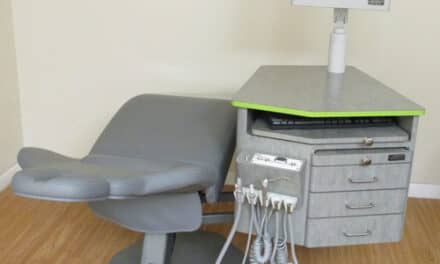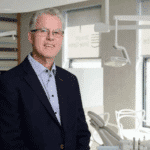by Kelly Murray
 |
Wikipedia’s simplified definition of “office politics” refers to the way co-workers act among each other. Office politics is like a disease: It exists in every office, but an educated, aware office staff can convert negative aspects of office politics into positive growth. The attitude of the staff, orthodontists, and managers guides the outcome of issues that may surface.
If left unchecked, the sting of negative office politics within a small group of people in an orthodontic office may be the cause of high staff turnover. A positive remedy is to create policies that all staff members adhere to so that negative aspects are squashed on arrival and positive aspects are fostered. This allows you to build and retain a successful team, making for a happy orthodontist and staff who, in turn, can impart that to the patients.
Robin Elledge summed up the five team dysfunctions that happen in an office in her 2004 PCSO presentation “Breakthrough Teamwork: Target Your Team Toward Optimal Success,”1 which was summarized for me Wanda Claro, DDS, a successful orthodontist and team builder. The culprit factors are lack of trust among co-workers, the fear of conflict, lack of commitment to the office, inattention to results, and avoidance of accountability. Knowing this information and watching for these types of behavior help to immunize the office against the negative effects of office politics.
Communication is a key factor. Staff members are going to form friendships. This can be good and bad. It is positive when it builds trust, because with trust there is sharing of ideas. Commitment to each other forms along with team-building. Dark clouds form when trust is broken and personal boundaries are crossed. That is when the policies come into play to help everyone involved to get back on track and stop the negative disease from sucking the life out of the team.
These office polices should include staff etiquette rules. The rules need to be in place before heated issues arise. Susan Morem, a business consultant from Minneapolis, and author of How to Gain the Professional Edge,2 eloquently and simply addresses this by saying “respond instead of react.” She defines this by saying that reaction is immediate and emotional, so there is no thinking involved, and it is more likely that things are said that will later be regretted. A response, says Morem, is planned and controlled and leads to fewer communication issues later. Hurt feelings and apologies are avoided by the staff person taking a minute to process the situation and then to respond rather than react.
Robin Elledge emphasizes that open communication is also important to keep the team healthy. Secrets keep the team in a state of disease. Always have an open communication clause built into the implemented policies. This includes new plans, changes in staff and staff duties, and even bad news—all things that affect the team. Offer explanations, recognize a job well done, and applaud good effort. All these things add to a happy, committed staff. Listen to feedback and assure everyone that it is perfectly fine to give negative feedback also. The whole staff can learn from both kinds of feedback.
Conflict does not have to be negative. Teams that trust and have courage can discuss all sorts of “hot” issues and come up with great solutions. They walk away from the heated discussion feeling empowered, inspired, and important. They feel like they made a difference.
Accountability is another important component in team-building and in keeping negative office politics disease at bay. The staff can become discouraged and rumors can start if a team member is not performing at his or her expected level. People then start making excuses for not being accountable. The reasons turn into excuses when the team member loses steam and stops working toward a solution. The team is only as strong as the weakest person. Everyone on the team counts. Each member must be constructively encouraged to improve his or her personal best. This then builds attentiveness throughout the team. The focus of the team moves toward collective results and not just individual results, which creates a successful, strong team. The team spirit should help when a team member is facing a challenge. Other team members with the resources to do so should freely offer their assistance to help the team member overcome the hardship, which makes the whole team become better and stronger. When a team member rises to a personal challenge, the whole team should celebrate the success, too.
I hope these remedies have shed a little light on how to control negative office politics and will help you to start building a stronger team.
Kelly Murray has been working in orthodontics for 17 years. She can be reached at (949) 786-7800.
References
- Elledge R (summarized by Claro W). Breakthrough teamwork: target your team toward optimal success. [removed]www.pcsortho.org/bulletin/bulletin04/Winter04.html[/removed]. Accessed February 29, 2008.
- Morem S. How to Gain the Professional Edge. 2nd ed. New York: Ferguson Publishing Co; 2005.








